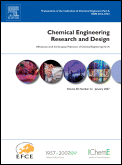
CHEMICAL ENGINEERING RESEARCH & DESIGN
Scope & Guideline
Pioneering Research in Chemical Engineering Excellence.
Introduction
Aims and Scopes
- Process Design and Optimization:
Focuses on methodologies for optimizing chemical processes, including the design of reactors, separation units, and integrated systems, with a strong emphasis on sustainability and energy efficiency. - Advanced Materials and Membrane Technology:
Explores the synthesis and application of novel materials, particularly membranes for separation processes, with a focus on enhancing performance and reducing fouling. - Modeling and Simulation:
Emphasizes the development and application of computational models to predict the behavior of chemical processes, facilitating better design and operational strategies. - Environmental Engineering and Waste Management:
Addresses the treatment and management of industrial waste, including the recovery of valuable resources and the development of sustainable technologies for pollution control. - Biochemical Engineering and Biotechnology:
Investigates the use of biological systems and processes for the production of chemicals, biofuels, and pharmaceuticals, focusing on optimizing yields and process efficiency. - Nanotechnology and Advanced Characterization Techniques:
Involves the use of nanostructured materials and advanced characterization techniques to enhance chemical processes and product quality. - Energy Systems and Thermodynamics:
Covers the integration of energy systems within chemical processes, focusing on thermodynamic analysis and optimization for improved energy efficiency.
Trending and Emerging
- Sustainable Chemical Processes:
An increasing focus on sustainability, including the development of green chemistry practices and processes that minimize environmental impact and resource consumption. - Machine Learning and AI Applications:
The use of machine learning and artificial intelligence in optimizing chemical processes and predictive modeling is gaining traction, reflecting a broader trend towards data-driven decision-making in engineering. - Electrochemical Processes:
Research on electrochemical methods for carbon capture, energy storage, and conversion processes is emerging, driven by the need for cleaner energy solutions. - Advanced Characterization Methods:
There is a growing interest in advanced characterization techniques, such as in-situ imaging and spectroscopy, to better understand chemical processes at the molecular level. - Integration of Renewable Energy Sources:
The integration of renewable energy systems within chemical processes, particularly in the context of hydrogen production and carbon capture, is becoming a prominent research area. - Biotechnology and Synthetic Biology:
Research at the intersection of chemical engineering and biotechnology, especially relating to the production of bio-based chemicals and materials, is on the rise. - Nanotechnology in Chemical Engineering:
The application of nanotechnology to enhance materials and processes, including catalysis and separation technologies, is increasingly prevalent.
Declining or Waning
- Traditional Separation Processes:
There has been a noticeable decrease in research focused solely on conventional separation techniques such as distillation, as newer methods and technologies (e.g., membrane separations) gain prominence. - Basic Chemical Reaction Kinetics:
While foundational studies are still important, there is less emphasis on purely theoretical kinetic models without integration into broader process applications or innovative methodologies. - Conventional Waste Treatment Methods:
Research on traditional waste treatment processes is declining in favor of more sustainable and innovative approaches, such as bioremediation and advanced oxidation processes. - Single-Use Technologies in Bioprocessing:
The focus on single-use technologies in bioprocessing is waning as the industry shifts towards more sustainable and reusable options. - Static Modeling Techniques:
There is a trend away from static modeling approaches towards more dynamic and data-driven models that account for real-time process variations.
Similar Journals
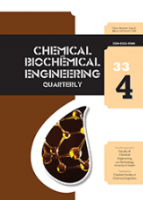
CHEMICAL AND BIOCHEMICAL ENGINEERING QUARTERLY
Unlocking Potential Through Open Access ResearchCHEMICAL AND BIOCHEMICAL ENGINEERING QUARTERLY, published by the Croatian Society of Chemical Engineering Technology, is a distinguished open-access journal that has been providing a platform for the dissemination of innovative research since its inception in 1987. With a focus on the fields of biochemistry and chemical engineering, this quarterly journal addresses a wide array of topics, including process chemistry and technology, making significant contributions to both academia and industry. Despite its current positioning in the Q4 category for biochemistry and Q3 for miscellaneous chemistry and process chemistry in 2023, the journal continues to strive for greater impact, catering to researchers, professionals, and students alike. Its open-access model, in place since 2001, ensures that cutting-edge research is accessible to a broad audience, fostering collaboration and knowledge sharing within the scientific community. By promoting high-quality research and providing insights into the latest advancements, Chemical and Biochemical Engineering Quarterly remains an essential resource for those involved in the chemical and biochemical engineering disciplines.
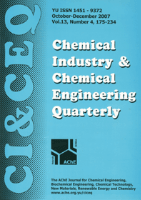
Chemical Industry & Chemical Engineering Quarterly
Connecting Scholars and Professionals in Chemical Innovation.Chemical Industry & Chemical Engineering Quarterly is a distinguished, open-access journal published by ASSOC CHEMICAL ENG that serves as a vital platform for innovative research within the field of chemical engineering. Established in 2000 and actively disseminating knowledge since then, this journal has garnered acknowledgment for its contribution to the field, currently being ranked in the third quartile (Q3) of Chemical Engineering (Miscellaneous) for 2023. With a focus on advancing understanding of chemical processes and facilitating the integration of industry operations with engineering principles, it provides a forum for both theoretical and applied research. The journal is committed to maintaining high standards of academic rigor, supported by its indexed presence in Scopus, where it ranks #173 out of 273 in the general chemical engineering category. As an open-access journal, it promotes the rapid dissemination of research findings, enhancing accessibility for scholars, professionals, and students worldwide. Based in Serbia, the journal is an essential resource for those seeking to stay at the forefront of chemical engineering advancements.

KOREAN JOURNAL OF CHEMICAL ENGINEERING
Elevating Knowledge in Chemical Engineering.The Korean Journal of Chemical Engineering is a prestigious publication by the Korean Institute of Chemical Engineers, dedicated to advancing the field of chemical engineering and its associated sciences. Established in 1984, this journal has made significant contributions to the dissemination of innovative research, covering a broad spectrum of topics within chemical engineering and general chemistry. With a current impact factor placing it in the Q2 quartile within both the chemical engineering and chemistry categories, it is recognized for its rigorous peer-review process and high-quality articles. The journal provides a valuable platform for researchers, professionals, and students to share their findings and collaborate on emerging methodologies and technologies. Although it does not offer open access options, its broad international readership, bolstered by its Scopus rankings — including a commendable #108 in general chemical engineering — ensures widespread visibility and dissemination of published works. As it approaches its 40th anniversary in 2024, the Korean Journal of Chemical Engineering continues to be an essential resource for anyone engaged in the field, driving innovation and academic dialogue worldwide.

Chemistry & Chemical Technology
Fostering Innovation in Chemistry and Chemical EngineeringChemistry & Chemical Technology is an esteemed academic journal published by LVIV POLYTECH NATL UNIV, specializing in the interdisciplinary intersections of chemistry and engineering. With its ISSN 1996-4196, this journal has become a significant platform, contributing to advancements and discussions within the fields of Chemical Engineering and Chemistry, as evidenced by its rankings in the 2023 category quartiles, where it is placed in Q3 for both disciplines. The journal aims to disseminate high-quality research articles, studies, and reviews from 2012 to 2024, welcoming contributions from researchers and professionals keen on driving innovation and fostering collaboration in the chemical sciences. As an open-access journal based in Ukraine, it has established a reputation for accessibility, providing comprehensive insights and a global perspective on the latest developments. Engaging with this journal not only enhances your understanding of current trends but also contributes to the global body of knowledge in chemical technology.

Engineering Review
Connecting researchers for impactful engineering solutions.Engineering Review is a prominent academic journal published by the University of Rijeka, Faculty of Engineering in Croatia. As an emerging outlet in the field of engineering, the journal has been providing a platform for interdisciplinary research since its inception in 2011, with a commitment to disseminating high-quality studies up to the horizon of 2024. Although currently categorized as Q4 in the Engineering (miscellaneous) section and ranking 242 out of 307 in General Engineering per Scopus metrics, the journal aims to bolster its impact and reach within the engineering community. With a focus on innovative approaches and practical applications in various engineering disciplines, Engineering Review invites contributions from researchers, professionals, and students alike, fostering a collaborative environment for the advancement of engineering research in a global context. While it is not an open-access journal at this time, it remains a vital resource for those engaged in cutting-edge engineering endeavors.
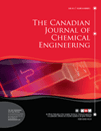
CANADIAN JOURNAL OF CHEMICAL ENGINEERING
Cultivating Excellence in Chemical Engineering ScholarshipCanadian Journal of Chemical Engineering, published by Wiley, stands as a pivotal platform in the field of chemical engineering, addressing a myriad of topics essential for researchers, professionals, and students alike. With ISSN 0008-4034 and E-ISSN 1939-019X, this journal has been a cornerstone of chemical engineering scholarship since its inception in 1958 and continues to provide valuable insights through its rigorous peer-reviewed articles. The journal is ranked in the Q2 category of the Scopus quartile rankings, reflecting its influence and relevance within the chemical engineering community, with a notable position of #137 out of 273 in the general chemical engineering field. Although it does not offer open access options, its comprehensive coverage of contemporary research and applications solidifies its status as a vital resource for advancing knowledge and innovation in chemical engineering.
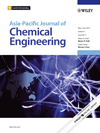
Asia-Pacific Journal of Chemical Engineering
Innovating the Future of Chemical Engineering in the Asia-Pacific.The Asia-Pacific Journal of Chemical Engineering, published by WILEY, serves as a vital forum for the dissemination of innovative research in the interdisciplinary domains of chemical engineering, renewable energy, sustainability, and waste management. Established in 2006, this esteemed journal has achieved a notable impact factor that reflects its commitment to advancing knowledge and practices within the chemical engineering community. With its Q3 category rankings across various fields, including Chemical Engineering (Miscellaneous), Renewable Energy, Sustainability and the Environment, and Waste Management and Disposal, the journal holds a significant position among its peers, assuring readers of quality and relevance in published content. Although it does not offer Open Access options, the Asia-Pacific Journal of Chemical Engineering remains an essential resource for researchers, professionals, and students aiming to stay at the forefront of innovations affecting the Asia-Pacific region and beyond. The journal's broad scope covers diverse topics, making it an integral part of the academic landscape from 2006 to 2024.
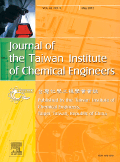
Journal of the Taiwan Institute of Chemical Engineers
Exploring the frontiers of chemistry and engineering.The Journal of the Taiwan Institute of Chemical Engineers is a prestigious publication in the field of chemical engineering and chemistry, published by Elsevier. With an impressive impact factor placing it in the top quartiles (Q1) of both the Chemical Engineering (miscellaneous) and Chemistry (miscellaneous) categories, this journal serves as a vital platform for disseminating cutting-edge research and innovative findings. Since its inception in 2009 and continuing through 2024, it has established a strong reputation with notable Scopus rankings—ranked 40th out of 273 in General Chemical Engineering and 62nd out of 408 in General Chemistry, reflecting the journal’s significance in its field. By offering open access options, the journal ensures that research is readily available to a global audience, fostering collaboration and knowledge exchange among researchers, professionals, and students. The Journal of the Taiwan Institute of Chemical Engineers is dedicated to advancing the discipline of chemical engineering and supporting the development of novel scientific methodologies and applications.
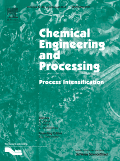
Chemical Engineering and Processing-Process Intensification
Pioneering Research in Process OptimizationChemical Engineering and Processing - Process Intensification is a leading journal published by Elsevier Science SA, specializing in the multifaceted domain of chemical engineering. With the ISSN 0255-2701 and E-ISSN 1873-3204, this journal stands as a beacon of knowledge, facilitating the dissemination of innovative research from 1984 onwards and continuing through 2024. Renowned for its rigorous peer-review process, it boasts a distinguished reputation, reflected in its top-tier rankings within several fields: Q1 in Chemical Engineering (Miscellaneous), Q2 in Chemistry, and Q1 in Industrial and Manufacturing Engineering. This journal focuses on the advancements in process intensification, which are crucial for optimizing efficiency and sustainability in chemical processes. Although access is not open, the journal serves as an essential resource for researchers, professionals, and students alike who seek to advance their understanding and contribute to the evolving landscape of chemical engineering and process technology. Join a community of innovators driving the future of process engineering through impactful and cutting-edge research.

Korean Chemical Engineering Research
Navigating the Landscape of Chemical Engineering ResearchKorean Chemical Engineering Research, published by the Korean Institute of Chemical Engineers, serves as a vital resource for those engaged in the expansive field of chemical engineering. With an ISSN of 0304-128X and an E-ISSN of 2233-9558, the journal offers a platform for scholarly articles that cover various aspects of chemical processes, innovative technologies, and sustainability practices in engineering. Despite being in the Q4 category of chemical engineering journals as per the 2023 rankings, the journal's focus on emerging research from South Korea and beyond presents unique insights valuable to professionals, researchers, and students alike. Operating under effective citation metrics, it finds its place within Scopus, ranking at 229 out of 273, indicating a niche yet specialized contribution to the broader scientific community. We invite you to explore this integral journal, which is committed to fostering discourse and development in chemical engineering through its extensive archive, dating back to 2014 and continuing to evolve through 2023.